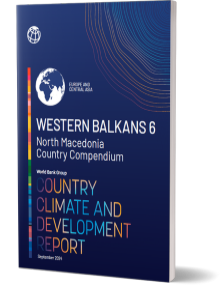Background

Download Full Report | Executive Summary (English) | (Macedonian)
Key Findings
- Investing in climate adaptation, though costly, offers significant benefits. North Macedonia needs to invest US$6.4 billion over the next decade to protect against climate change impacts, equivalent to 0.8-1.2% of GDP per year until 2050. These investments yield the "Triple-A Dividend": avoided losses, accelerated economic potential, and amplified social and environmental co-benefits. Adaptation investments can spur employment growth, skills improvement, and increased trade opportunities. A detailed benefit-cost analysis concluded that every 1 Euro invested, can yield 2-10 Euro in benefits, with regional early warning systems resulting in even higher rewards.
- Achieving net zero emissions by 2050 in North Macedonia is feasible but demands radical transformations and decisive action. Energy system modeling indicates that North Macedonia can meet its 2030 emissions reduction target by decommissioning coal-fired plants and expanding solar and wind capacities. Post-2030, additional electricity demand would be met by solar and wind capacities, with hydro and natural gas balancing the renewable generation fluctuations. Reaching net zero by 2050 also requires significant energy efficiency improvements and extensive use of zero-carbon energy in transport, heating, and industry. The green transition's impacts on employment may be manageable but will necessitate a Just Transition Plan for coal regions and workforce reskilling.
- The net zero target by 2050 can be achieved with minimal impact on economic growth. Compared to current plans, North Macedonia would need to invest an additional US$1.7 billion by 2030 and US$5.6 billion by 2050 in the energy system, equivalent to about 2.6% of GDP per year. Most of the investment would go to scaling up renewable generation capacities. The impact on GDP per capita would be modest, less than 1 percent in 2050. Over 80% of the additional capital investments could be undertaken by the private sector, requiring an enabling regulatory environment and mobilizing financing through green bonds, public-private partnerships (PPPs), and EU funds.
Recommendations
The policy recommendations cover four areas.
- Resilience and adaptation – Though North Macedonia has developed legislation to enhance climate resilience and adaptation in key sectors such as agriculture, water, and human health, the legal framework for adaptation is lacking in other sectors, such as transportation and urban planning, and the implementation at local level is weak. Therefore, it is essential to consider multi-hazard risks, synergies, and trade-offs with other sectors when making adaptation policy decisions.
- Decarbonization and mitigation – The report outlines a comprehensive strategy for energy market liberalization, renewable energy (RE) development, and sustainable transport. These measures aim to ensure a sustainable, financially viable, and socially inclusive transition to a low-carbon economy.
- Macroeconomy and financing - To address fiscal sustainability and promote green initiatives, the report offers a set of recommendations focusing on fiscal rules and debt management, green financing, carbon pricing mechanisms, and implementation of reforms proposed in North Macedonia’s Just Transition Roadmap to ensure a transformative change towards a low-carbon economy and climate-resilient society.
- Regulatory/institutional framework and education and labor – The report calls for policy actions to adopt the necessary legislation, such as Draft Law on Climate Action and its bylaws, facilitate multi-level governance in climate action, improve planning and oversight including through public consultation processes and citizen engagement. Further, North Macedonia needs to implement education and labor policies that enhance human capital to support the country's ambitious climate goals, specifically by investing in skill development to meet the demands of a green economy, improving vocational and non-formal education, and strengthening social protection mechanisms to assist workers affected by the transition to a carbon-neutral economy.
